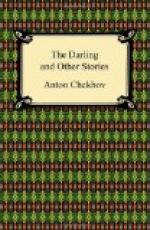It was broad daylight outside, but the doctor still sat at the table moving the pencil over the paper and writing mechanically.
“My dear Sir. . . . Little foot.”
Or he walked about and stopped in the drawing-room before a photograph taken seven years ago, soon after his marriage, and looked at it for a long time. It was a family group: his father-in-law, his mother-in-law, his wife Olga Dmitrievna when she was twenty, and himself in the role of a happy young husband. His father-in-law, a clean-shaven, dropsical privy councillor, crafty and avaricious; his mother-in-law, a stout lady with small predatory features like a weasel, who loved her daughter to distraction and helped her in everything; if her daughter were strangling some one, the mother would not have protested, but would only have screened her with her skirts. Olga Dmitrievna, too, had small predatory-looking features, but more expressive and bolder than her mother’s; she was not a weasel, but a beast on a bigger scale! And Nikolay Yevgrafitch himself in the photograph looked such a guileless soul, such a kindly, good fellow, so open and simple-hearted; his whole face was relaxed in the naive, good-natured smile of a divinity student, and he had had the simplicity to believe that that company of beasts of prey into which destiny had chanced to thrust him would give him romance and happiness and all he had dreamed of when as a student he used to sing the song “Youth is wasted, life is nought, when the heart is cold and loveless.”
And once more he asked himself in perplexity how he, the son of a village priest, with his democratic bringing up—a plain, blunt, straightforward man—could have so helplessly surrendered to the power of this worthless, false, vulgar, petty creature, whose nature was so utterly alien to him.
When at eleven o’clock he put on his coat to go to the hospital the servant came into his study.
“What is it?” he asked.
“The mistress has got up and asks you for the twenty-five roubles you promised her yesterday.”
TALENT
AN artist called Yegor Savvitch, who was spending his summer holidays at the house of an officer’s widow, was sitting on his bed, given up to the depression of morning. It was beginning to look like autumn out of doors. Heavy, clumsy clouds covered the sky in thick layers; there was a cold, piercing wind, and with a plaintive wail the trees were all bending on one side. He could see the yellow leaves whirling round in the air and on the earth. Farewell, summer! This melancholy of nature is beautiful and poetical in its own way, when it is looked at with the eyes of an artist, but Yegor Savvitch was in no humour to see beauty. He was devoured by ennui and his only consolation was the thought that by to-morrow he would not be there. The bed, the chairs, the tables, the floor, were all heaped up with cushions, crumpled bed-clothes, boxes. The floor had not been swept, the cotton curtains had been taken down from the windows. Next day he was moving, to town.




